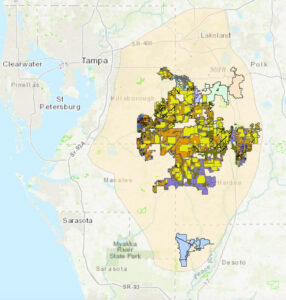Operating permits will only require staff approval.
By Dawn Kitterman
The Bradenton Times
BRADENTON — During a meeting on Tuesday, Manatee County Commissioners voted unanimously to change how mining operating permits will be approved under the county’s phosphate mining code. The change moves operating permit approval under administrative oversight, instead of requiring commissioners’ votes.
The county’s existing phosphate mining ordinance was enacted in 2004 and included that applications for operating permits must go before the board of county commissioners before issuance. Master Mining Plans will still require public hearing and approval by the BOCC. The change made to the ordinance only impacts the associated operating permit processes.

Map of phosphate mines. Source: Florida Department of Environmental Protection
Natural Resources Department staff who presented before commissioners during Tuesday’s meeting said the proposed change to the submittal and approval process for mining-related operating permits would streamline and improve efficiency both for the county and the applicant.
Although mining operating permits under the revised ordinance will be approved administratively, staff said Tuesday that even under the proposed change, operating permits would never be approved unless the applications adhere to the county’s existing codes and are in keeping with an already approved master mining plan. A master mining plan and/or any significant changes requested of an approved plan will still require public hearings before the county’s planning commission and final approval by the board of county commissioners.
The activities addressed in an operating permit application include site-specific operation details such as updates to production and reclamation schedules, updates on volumes of clay disposition, environmental monitoring data, surety and reclamation bonds, and other operations categorized as incidental by county staff.
All significant requests to amend an approved mining plan, including changes that would affect watershed protection overlay districts, mine expiration dates, manner or sequence of mining activities, setback waiver requests, or changed impacts to wetlands, activities that may affect 25-year floodplain or perennial streams, would all require approval by the county commission as under the previous ordinance.
“An operating permit is very straightforward in terms of requirements. It’s almost a checklist,” Manatee County Director of Natural Resources Charlie Hunsicker told commissioners.
Hunsicker stressed that nothing could be approved administratively that was not in keeping with an existing master mining plan and added that the proposed change to the operating permit approval process is something that county staff have had under consideration and research for several years before bringing the item before the board.
Natural Resources employee Alissa Powers, who provided a staff presentation on the proposed change, highlighted that “a master mining plan states specifically the acres that can be mined and the acres that are to be conserved, preserved, or un-mined, changes to that would have to come back to the board.”
Despite county staff assurances, some members of the public remained skeptical. Glen Compton, chairman of the environmental non-profit ManaSota 88, was one such public speaker who addressed commissioners.
“There is a lot of shifting to staff as far as decision-making processes as proposed here, and my question is, do you feel comfortable enough that you have the staff in place that can do the job adequately?” Compton asked, emphasizing the importance of the county’s mining ordinance.
Robert Brown, a former employee of the county’s Natural Resources’ Environmental Division, also addressed the board. Brown shared that he was among the staff who worked on the county’s existing mining ordinance in 2004 and offered some background on staff’s consideration of the ordinance’s provisions at that time and some of the challenges it presented to staff when the board was tasked with operating permit approvals.
Brown said he felt comfortable with the proposed changes to the operating permit process. “I do support this,” he told commissioners.
Commissioners approved the change unanimously, and the existing ordinance language concerning operating permit processes will be replaced with the updated Phosphate Mining Ordinance 24-28.
Click here to watch the video of the item presentation, discussion and commissioner vote from the Feb. 27 BOCC meeting.
Dawn Kitterman is a staff reporter and investigative journalist for The Bradenton Times covering local government news. She can be reached at dawn.kitterman@thebradentontimes.com.
This article first appeared in The Bradenton Times. To read the original version, click here.